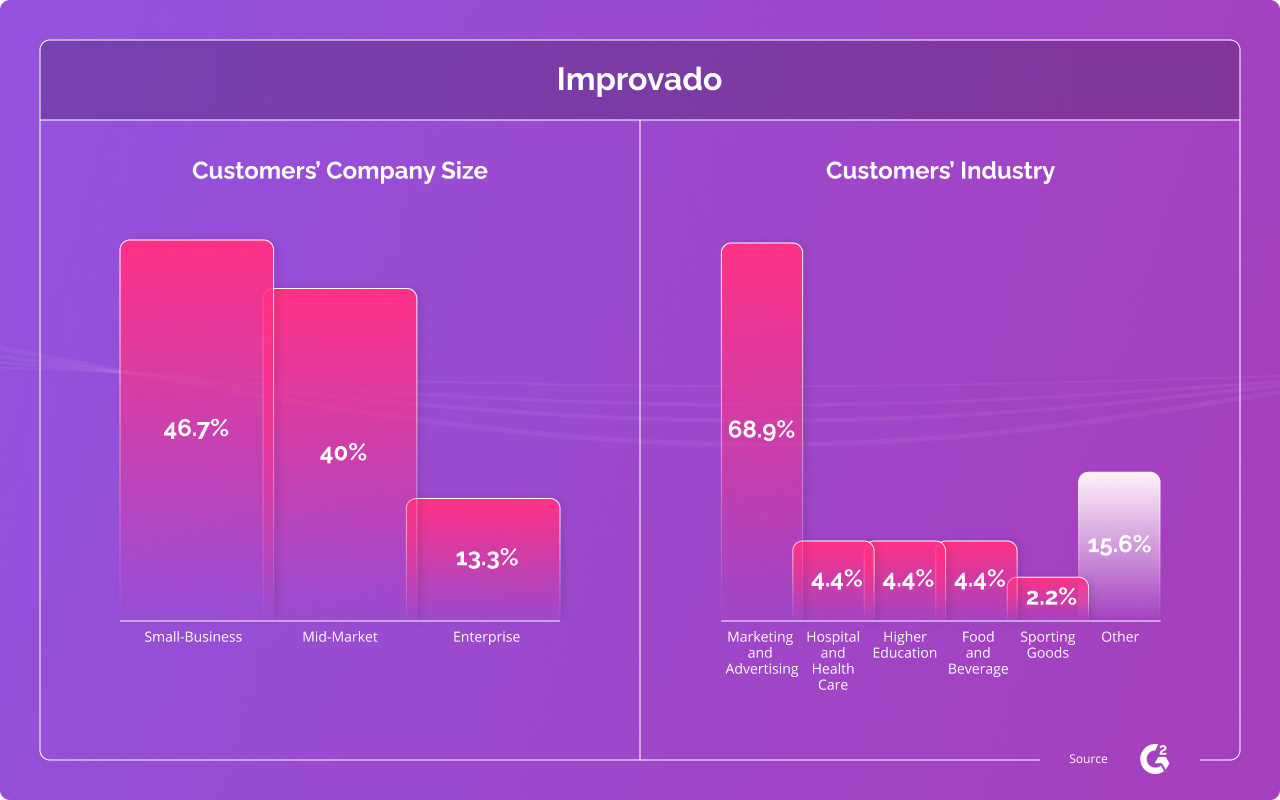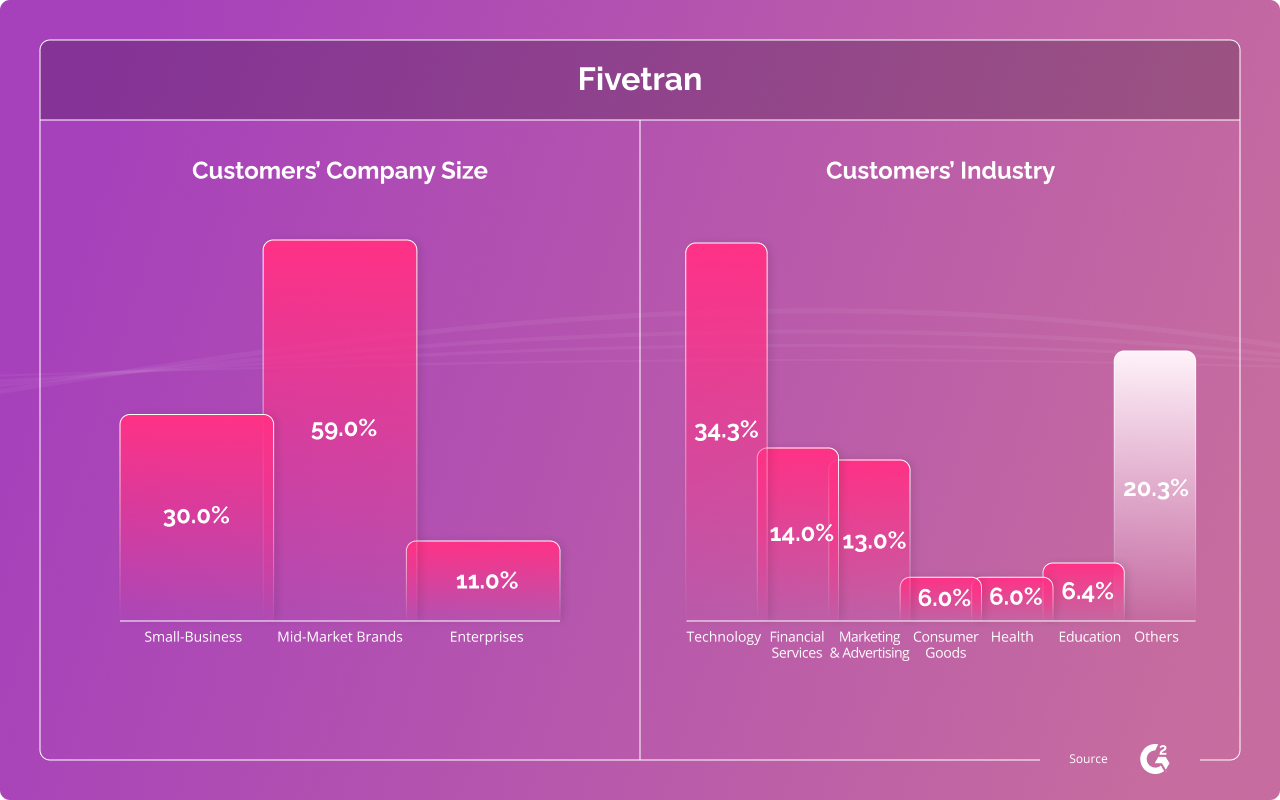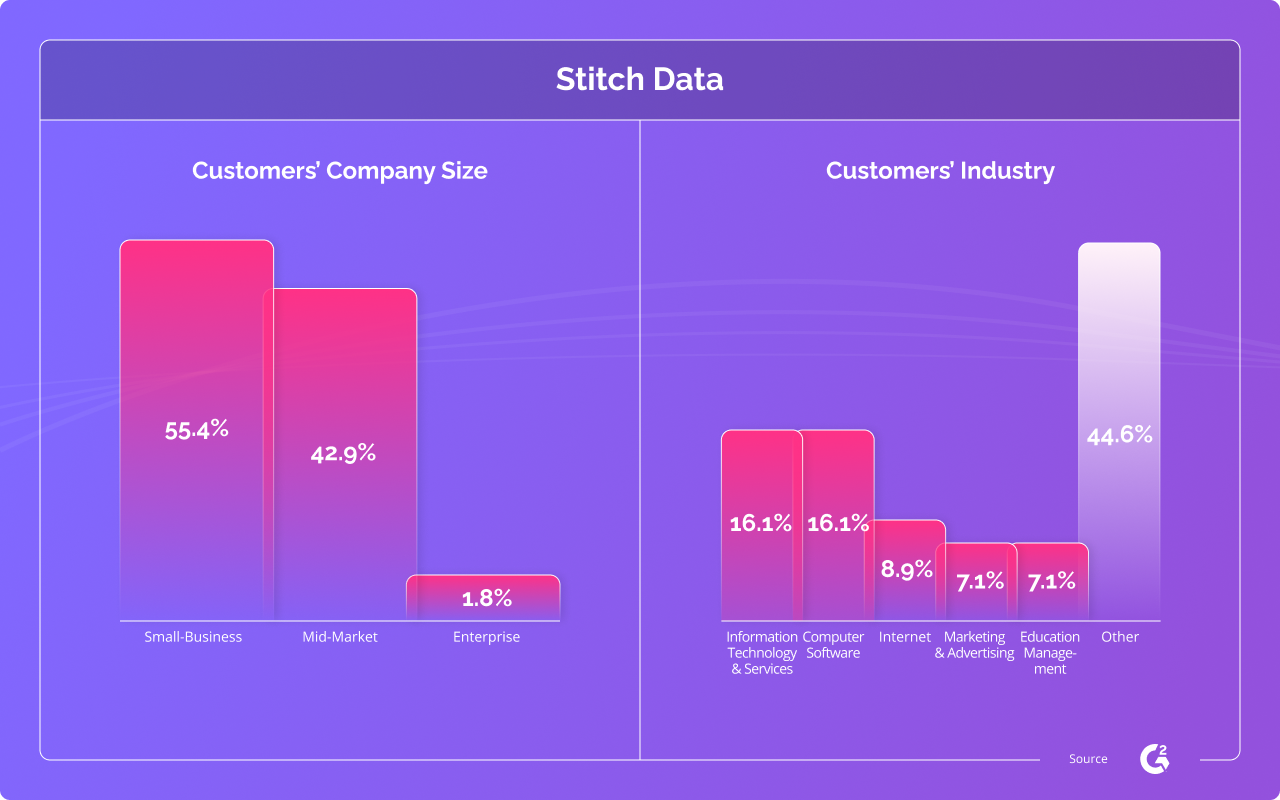Dataslayer.ai is a reporting automation tool that helps digital marketers pull all their PPC, SEO, social and web analytics data into one place including spreadsheets and data visualization platforms for reporting and analysis.
.png)
Dataslayer.ai is a reporting automation tool that helps digital marketers pull all their PPC, SEO, social and web analytics data into one place including spreadsheets and data visualization platforms for reporting and analysis.

Improvado is an enterprise-grade, no-code Revenue Data Platform that automates how marketing, sales, and revenue teams extract, transform and load data from source to destination.
The platform offers prebuilt connectors to over 500 data sources, making it convenient for users who want to efficiently aggregate and push data to data warehouses or to BI, visualization, or analytics tools. Improvado’s clients can also request custom connectors if they need to work with a data source not listed in the integration catalog. Furthermore, the platform offers a high level of granularity, allowing you to explore insights at any level.
Improvado is known for its advanced data transformation engine, known as the Marketing Data Common Model (MCDM). This functionality automatically unifies disparate naming conventions that usually occur when pulling related data from different sources, removes errors and duplicates, and runs automated data mapping and transformation sequences using self-service or prebuilt templates. That way, you can get access to analysis-ready data in no time and start analyzing it in built-in dashboards.
Thanks to its compliance with HIPAA, SOC-2, and enterprise SLA, Improvado is compatible with businesses in privacy-sensitive industries, like health, insurance, and finance.
Improvado is specifically designed for marketing, sales, and revenue teams. Thus, it is fully fitted with features that cater to the needs of these departments and requires zero technical skills.
Marketing, sales, and revenue teams use Improvado to access insights on all revenue-generating efforts across their channels and customer touchpoints. This is powered by Improvado’s efficient marketing attribution modeling functionality that enables users to build custom data pipelines that automatically attribute conversions to the right channels.
As a no-code platform, Improvado is suitable for teams with zero coding skills and SQL knowledge. Improvado also provides professional services to customers who need help with building custom data dashboards, handling data migration, and providing team-wide training. As an add-on, Improvado provides data warehouse maintenance services, freeing up your company’s valuable time and resources.
The platform has users from several industries, encompassing professionals in mid-market brands, large-scale enterprises, and agencies.

Improvado doesn’t tie its users to a specific contract value. Improvado assesses your company’s unique needs when you request a quote and calculates a custom pricing plan best suited for your business.
Improvado’s flexible pricing means you get access to and pay only for the features and bandwidth you need.
Furthermore, Improvado offers a token, called DECS points, which you can spend on APIs, flat file ingestion, report type development and modification, and other development needs.
Improvado has a library of over 500 data sources across several categories, including advertising platforms, CRMs, payment gateways, eCommerce tools, and more. If you can’t find a specific data source in the integration library, you can always request a custom connector, and it will be built for you.
The platform also supports leading data warehouses like Google BigQuery, Amazon RedShift, Snowflake, and more.
Check out a full list of Improvado’s data sources and destinations. The solution also has a comprehensive data dictionary featuring all the metrics, properties, dimensions, and more, as supported by each data source. Take a look here.

.png)

.png)



.png)

.png)
Its amazing how Improvado had the ability to get us the data we need. I highly recommend anyone looking to aggregate their data to use Improvado.

Its amazing how Improvado had the ability to get us the data we need. Simply put, we need to have a lot of flexibility in this industry. I highly recommend anyone looking to aggregate their data to use Improvado.
They really have been a major part of our success and the people there are great to work with.
Improvado provide a reliable foundation that are building our business on top of. The kind of partnership we have with them has truly paid off.

.png)

.png)
Improvado has the most expansive list of connections of any marketing ETL tool I've reviewed. This has saved us an incredible amount of time and money.


Improvado has the most expansive list of connections of any marketing ETL tool I've reviewed. In addition to what the tool already brings in, you can also work with their team to bring in additional or custom connections, as well as any specific dimensions and measures you might need.
Improvado is the most customizable marketing ETL you can use. I highly suggest this for companies/organizations that rely on both standard data sources/metrics as well as custom connections.
With Improvado, we are able to provide marketing analytics as a service at scale. We have reduced our need for in-house developers and can rely solely on Improvado to feed us our clients' data. This has saved us an incredible amount of time and money.
Formerly known as Xplenty, Integrate.io is an ETL and ELT platform that lets users build automated pipelines that transform business data into actionable insights in real-time and at scale.
The platform offers integration to over 100 data sources alongside 200+ transformation options, making it easy for users to push analysis-ready data into their required destinations for reporting, analytics, and attribution.
One interesting component of its ETL infrastructure is the reverse ETL tool. This allows users to pull data from warehouses into business platforms like CRMs, marketing automation tools, and analytics platforms for easy activation. The platform also allows users to schedule their pipeline and monitor changes throughout the integration process.
Integrate.io's ELT solution allows users to leverage data replication for unifying data streams into one destination. It offers auto-schema mapping functionalities, which you can use to consistently maintain clean column, row, and table updates.
Marketing teams can use Integrate.io for a wide range of use cases. Some examples include:
Integrate.io provides a range of pricing plans starting from $15,000 a year. These plans are based on the number of data connectors, monthly data processed, scheduling frequency, and other criteria. A free trial is included so customers can explore the features and services available before committing to a plan.
Furthermore, Integrate.io offers a custom Enterprise plan designed to fulfill particular requirements.
Integrate.io natively integrates with 150+ platforms for marketing, sales, customer success, and development teams.
The platform also offers a REST API to connect any database, file storage, or external HTTPS/SOAP service. Furthermore, if you need a custom integration built, Integrate.io allows you to send a direct request.
However, customers complain about a large number of issues that arise during the data extraction process, which is especially true for companies processing large volumes of data. Customers mention latency in data connectors, that API limits are very quickly achieved, and how they were charged for a connector that failed to integrate much-needed data. All in all, data extraction shortcomings may come in the way of scalability.
Panoply.io is a cloud data platform providing ETL and data warehousing services for individuals and teams.
Its integration functionality is pretty standard, allowing users to connect data from multiple sources and control how it is collected. For instance, you can manage your destinations, primary and incremental keys, schemas, and how the system handles nested data.
The platform also supports User Defined Functions (UDFs), enabling users to perform advanced data manipulations.
The platform's data warehousing solution makes it a valuable option for users new to data management as they wouldn't need to worry about setting up and connecting to external data warehouses, especially if they're small or medium-sized businesses with minimal data needs. For users who already house their data in external warehouses like RedShift and BigQuery, Panoply.io can connect data sources and deliver them to these destinations. However, this process requires some technical maneuvering.
Panoply.io offers integration with BI and visualization tools so users can generate insights, attribute ROI, and make data-driven decisions faster.
Panoply positions itself as a tool for data engineers, analysts, and scientists. Additionally, Panoply can also be used by business analysts, marketers, product managers, and decision-makers who require access to data insights for informed decision-making.
Thus, the platform can be used for marketing analytics purposes, such as performance tracking, ROI analysis, segmentation, and A/B testing.
A lot of customers complain about Panoply's customer support response time and, in general, about the level of support the team provides during the onboarding and operations. The lack of support means you need to have in-house expertise and IT resources to take care of the platform and make sure the data flows smoothly.
Panoply.io offers three pricing plans: Lite, Basic, and Standard, covering data warehousing and ETL solutions. Every user gets access to unlimited connectors, rows, and users.
Lite costs $399/month, offering a 1TB data warehouse. Basic charges $1089/month with 2TB of data warehouse storage space and the ability to request custom data connectors. Standard costs $1719/month and offers 4TB of warehouse storage, HIPAA compliance, onboarding with a data architect, warehouse and query support, and custom connector requests.
Panoply.io comes fitted with over 300 integrations encompassing data sources, visualization platforms, and ETL tools, among others.
Only users on the top two pricing plans can request custom connectors. However, you can leverage supported APIs and CSV file connectors to integrate data from your custom sources.
Dataddo is a cloud-based data integration and marketing reporting platform that helps companies aggregate data from various sources, automate data pipelines and generate dashboards.
It offers granular control over data storage (including vendor lock avoidance), manual, advanced, and SQL transformations, pre-built templates and dashboards, data quality checks, 24/7 customer support, and professional services, such as onboarding, training, and consulting.
The platform is designed to be user-friendly and intuitive with drag-and-drop capabilities, allowing users to quickly set up data integrations and pipelines. It integrates with a wide range of third-party visualization tools, such as Tableau, Power BI, and Qlik, supports numerous destinations, including cloud storage, databases, and analytics tools, and offers custom sources, transformations, and scheduling options.
The platform is also compliant with major security protocols, including SOC-2, GDPR, and HIPAA.
Dataddo is built for marketing teams and professionals aiming to streamline their data collection, transformation, and analysis processes. The platform can be used for a range of use cases, including:
Dataddo pricing is based on the number of data sources and data flows used. Pricing plan allows customers to buy licenses or subscriptions that can be renewed annually or monthly.
There are four different types of plans: Free, Data to Dashboards, Data Anywhere, and Headless:
Dataddo integrates with over 200 data sources, including databases, storage solutions, marketing and analytics tools, social media platforms, and visualization solutions. Additionally, Dataddo pulls data from some finance, HR, and accounting platforms.
If you need a specific integration that isn’t available in the prebuilt integration library, Dataddo will build a new connector within 10 business days.
Some Dataddo users mention that data sources can fail at any time, experience delays, push low-quality data, and require constant maintenance. These issues may require your team to push data manually and spend time fixing the problems, instead of building dashboards or deriving insights.
Fivetran is a fully-managed ELT platform that helps business teams to automatically aggregate, clean and load business data from multiple sources to the destination of their choice.
With over 160 native integrations, the platform makes it possible for business teams to connect to a wide variety of data sources for efficient, data-driven decision-making.
Fivetran offers a slew of advanced data transformation capabilities through the open-source dbt Core, which is fairly popular among data analysts. This allows the platform’s users to leverage functionalities like transformation scheduling, data lineage graphs, notifications, and more. But as with all open-source tools, users will need to be extremely careful, especially when large volumes of data are involved.
That said, Fivetran claims to offer a comprehensive privacy, security, and compliance program that covers HIPAA, SOC-2, and ISO, among others.
Fivetran is designed as a versatile tool that caters to a broad range of customers in different fields. This includes marketers, sales professionals, finance teams, engineers, and product managers, among others.

Fivetran runs on a pay-as-you-use model. This means that you get billed every month for the volume of data you extract, load, and transform through the platform.
Fivetran offers over 160 native connectors to data sources for multiple use cases, from marketing, sales, and finance to engineering, support, and product analytics. However, it doesn’t offer a seamless means for requesting custom connectors.
If you need a specific connector, you’ll need to go through the feature request portal to either pitch a new connector idea or upvote existing requests from a community of Fivetran customers. Also, if you have a private API or a custom data source unique to your organization, Fivetran allows you to build it externally and integrate it into the platform using its “function connector”. But this is supertechnical and requires advanced coding skills.
Funnel is a low-code platform automating the collection, preparation, and analysis of marketing data. It is compatible with over 500 sources, which permits marketing teams, IT personnel, and data analysts to combine information from multiple resources, apply simple transformations, then feed this data into an analytics or visualization tool or a data warehouse.
Funnel supports a low number of data transformation features:
Funnel.io also has a dashboard named Data Explorer which enables users to examine the raw data and store and share their queries. Additionally, Funnel gives scheduled import and export features depending on the pricing plan selected. With an Essential package for marketers, output from the warehouse can be done every six hours, while Enterprise plans involve exporting every two hours.
Funnel caters to the needs of digital marketers, data analysts/BI experts, and engineering/IT professionals. The platform is used by organizations across agencies, eCommerce stores, and offline retail outlets.
Digital marketers can use Funnel to analyze their marketing efforts more efficiently, while data analysts and BI experts can get an overview of performance across departments.
Generally speaking, Funnel covers basic data aggregation and export requirements. Companies with advanced tasks may require other solutions or manual input from in-house teams.
Funnel offers two tiers of pricing plans: one for marketers and another for marketing agencies.
The plans for marketers include:
Agencies have access to the Agency Small, Medium and Large plans with the same price points as the plans for marketers.
Additionally, Funnel also uses a system of credits called Flexpoints, which can be used to visualize available and used capabilities within their system, such as data connectors, transformation features, and other services. Each plan has a set number of Flexpoints that customers can use throughout their billing cycle. When customers exceed their points, further services are available at an additional price.
Funnel facilitates connection with over 500 applications and platforms covering various fields, such as social media, content management, email marketing, and more. The Plus and Enterprise plans allow clients to request custom data connectors that can both push and pull data from a data source.
Stitch Data is a cloud-first, open-source ETL platform that enables business teams to rapidly and securely move data from multiple sources to designated data warehouses for fast and efficient analysis.
The platform is an integral part of the Talend Data Fabric, providing prebuilt connectors to over 100 databases and SaaS applications, with support for leading data warehousing platforms like Snowflake, RedShift, BigQuery, and Azure Synapse Analytics.
Stitch Data offers a simple interface with ready-to-query schemas designed to accelerate the process of onboarding and extracting insights from new data sources.
The platform, as stated in one of its documentation pages, does not support user-defined data transformation. This means that you can’t carry out advanced data transformation processes on the platform. It does support and automate a few basic preload transformation processes, like JSON structures, data typing, object names, etc., but these are only sufficient for light- and medium-duty data warehousing needs. Advanced data transformation capabilities can only be accessed by signing up on Talend, Stitch Data’s “parent platform”.
The platform is also compliant with major security protocols, including SOC-2 and HIPAA.
Stitch Data caters to small-, medium-, and large-scale organizations across multiple industries. This includes teams working in transportation, consulting, finance, retail, real estate, SaaS, healthcare, marketing, and more.
The platform offers solutions specifically designed for sales, marketing, and product intelligence teams. Stitch Data supports common marketing and sales data source connectors, like Facebook Ads, Google Analytics, HubSpot, Mailchimp, and others. It sources the data necessary for a high-level overview of performance, but the platform may lack sufficient data granularity to dig deep into campaign, page, and ad analytics.
Product intelligence teams leverage Stitch Data to understand how users interact with products, launch strategies, and ship new features immediately.
The platform offers a few advanced features like multiple destinations, advanced scheduling, and smart cache refreshing, which benefit enterprise companies.

Stitch Stitch Data offers a three-tiered pricing system: Standard, Advanced, and Premium.
Users on the Standard plan can choose to be billed monthly or annually, while users on higher plans pay annually.
For users on the Standard plan, billing starts at $100 for 5 million rows per month and can reach up to $1250 for 300 million rows. Stitch Data also lets users test run the platform for 14 days, free of charge. However, the free trial is only available on the Standard plan.
The Standard plan is best suited for individuals with minimum requirements for their data pipeline. The plan grants access to 10 out of 130 “standard” data sources. Only users on higher plans can use all of the prebuilt data sources, including “enterprise” sources like Amazon RDS, Oracle, Google Analytics 360, and Workday RaaS.
Stitch Data offers integration with 130 SaaS platforms and databases, delivering data to leading destinations (data warehouses, storage platforms, and data lakes) for analysis.
The data sources covered by Stitch Data include apps and platforms used by marketing and sales teams, like Google Analytics, Facebook Ads, Salesforce, SendGrid, etc.
Stitch Data makes provisions for pushing data from custom sources (sources not included in its library). You can use the platform’s Import API or build your own connectors using the Singer framework.
Import API acts as a reception point for arbitrary data sent as JSON files. The received data is then processed and sent to your chosen destination. On the other hand, the Singer framework is an open-source solution that allows you to build your own taps (a fancy word for connectors). However, both methods are highly technical and require coding expertise.
Furthermore, Stitch accepts requests for custom connectors. However, this service is only available to enterprise customers.
Supermetrics is a data integration platform that helps marketing and sales teams automatically pull data from siloed platforms—CRMs, marketing automation platforms, paid channels, and more—into a consolidated destination for reporting, analytics, or storage.
Supermetrics isn't a dedicated marketing attribution platform. Instead, it automates fast and efficient data delivery into Google Sheets, Excel or warehouses like BigQuery and Snowflake, where you can now connect all your touchpoints and create a custom attribution model relevant to your business yourself.
Supermetrics offers an automated reporting solution that helps users generate marketing reports for stakeholders as needed. It is also important to note that Supermetrics only encrypts and caches data for a few minutes and never stores it in a backup. This is a testament to its robust data security and privacy policies. But on the flip side, you can't conveniently work with historical data on such a platform.
Supermetrics is a tool primarily designed for marketing and sales purposes. However, the platform supports only 100 native data source connectors. And even marketers need to double-check if Supermetrics can pull data from all the critical platforms. Alternatively, a team can request a custom connector if the data is accessible through an API. Users can submit requests, vote for data sources suggested by others, and view beta connectors on the Supermetrics Roadmap website.
When opting for Supermetrics, a company should have data analysts on its team to perform manual data transformation tasks and ensure data accuracy. Numerous customers complain about encountering bugs or discovering that the platform failed to retrieve data for weeks without notifying them about the issue.
Supermetrics lacks extensive data transformation features besides Custom Fields, so in-house data analysts will be needed to organize the data and manage the unification of naming conventions when incorporating data from multiple sources into a single report. Existing clients have noted that the platform automatically imports vast data when connecting to a new data source, necessitating manual sorting.
Supermetrics offers a comprehensive pricing plan based on your preferred data destination. It offers five main destination options: Google Sheets, Supermetrics API, BigQuery, Looker Studio, and Excel.
Each plan has a separate set of pricing plans nested within. For example, the Google Sheets plan starts at $69/month and goes up $579. Enterprise plans for all data sources, BigQuery, and the Supermetrics API come with custom pricing based on your needs.
The platform also has several other destinations you can choose, and pricing depends on the volume of data and the number of users.
Supermetrics offers integration to 100+ platforms. However, only users on its enterprise payment plan can access all of the data source connectors. If you're on a lower-priced plan, an additional data source connector will cost an extra $35/month.
Also, if you need a custom connector, you can only use the Roadmap page to submit a request or upvote existing ones for consideration.
GreyMetrics helps agencies save time when sharing data. Pull all your marketing data into one location and generate beautiful reports and dashboards that auto-update every one hour. GreyMetrics integrates with over 20 platforms and has dozens of built-in templates so your reports look great from day one and are fully white-labelled to share with clients and stakeholders.